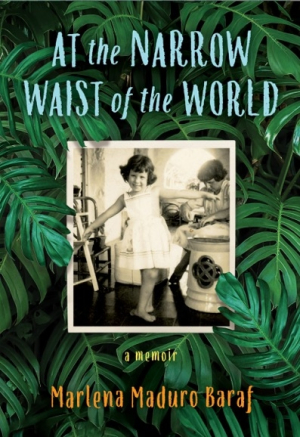At the Narrow Waist of the World
- 2019 INDIES Finalist
- Finalist, Autobiography & Memoir (Adult Nonfiction)
At the Narrow Waist of the World is a compelling account of what it is like to live through turbulence and come out on the other side.
Marlena Maduro Baraf’s memoir At the Narrow Waist of the World is a deep exploration of her conflicting identities between worlds, growing up with instability, and how family shaped her life.
Baraf moved between Panama and the United States. Hers is a unique perspective: that of a Jewish Panamanian who grew up during the cultural revolution of the 1960s and 1970s. It places its attention in the middle of a family of outsiders: Iberian Jews who survived the Inquisition and found themselves in Panama, a 95% Catholic society.
Baraf’s early life balanced between those communities, with her often yearning to join the religion and culture around her. Her close-knit extended family was all the closer because of their common Jewish heritage. As Baraf grew, her understanding of the uniqueness of her life intensified. She coped with her mother’s spiraling mental illness and lost her to multiple treatment facilities, often for years at a time. This sense of loss was compounded by the surprising death of her father.
Baraf began high school at a boarding school in the United States, which brought her concerns about her own mental health to the surface. She formed close bonds with the women at her high school and college and returned home to Panama, but felt out of place in both worlds. Her marriage, and telling her story, helped her to come to peace with her identity and to forgive her mother for the trauma of her childhood.
Lively and visual, the text’s descriptions of the sights, smells, and flavors of Panama impart a strong sense of its culture. The chronological narrative is jarring because of its episodic nature, though. Just as it begins to explore particular feelings or situations, it jumps to other vignettes, particularly at the book’s beginning, while the family members are still strangers to the audience. As the narrative progresses, it becomes more linear and tight.
The ending is a strong presentation of the book’s themes. Baraf’s ongoing struggles with her mental health are foiled against her mother’s declining health, and her memoir becomes as much a story of her mother as it is hers. She comes to realize that her mother’s “story has not changed but I have changed.”
The memoir fills a gap when it comes to firsthand accounts from Sephardic Jews living in the diaspora. It captures unique practices and elements of assimilation within the isolated community. Baraf’s family has a Christmas tree, for example, but always graced with a star at the top, never an angel, and shellfish and ham (but never pork!) are a part of their cuisine, going against thousands of years of Jewish tradition.
As Baraf separates her own story from the traumas she survived, letting her extended family ground her as she meanders between her Panamanian and American lives, At the Narrow Waist of the World becomes a compelling account of what it is like to live through turbulence and come out on the other side.
Reviewed by
Holly Jordan
Disclosure: This article is not an endorsement, but a review. The publisher of this book provided free copies of the book and paid a small fee to have their book reviewed by a professional reviewer. Foreword Reviews and Clarion Reviews make no guarantee that the publisher will receive a positive review. Foreword Magazine, Inc. is disclosing this in accordance with the Federal Trade Commission’s 16 CFR, Part 255.

